Austrian opera singer Richard Tauber (1891-1948) was one of the world's finest Mozartian tenors of the 20th century. With his monocle and high hat, he became the 'epitome of Viennese charm' with such popular musical films as Das Land des Lächelns/The Land of Smiles (1930) and Melodie der Liebe/Right to Happiness (1932).

German postcard in the Ross Luxusklasse series by Ross Verlag, no. 548, 1919-1924. Photo: Atelier Schneider, Berlin.
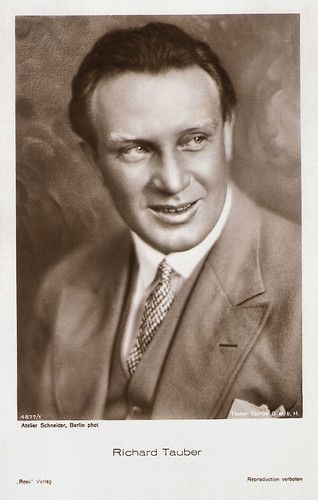
German postcard by Ross Verlag, no. 4877/1, 1929-1930. Photo: Atelier Ernst Schneider, Berlin / Tauber Tonfilm G.m.b.H.

Dutch postcard. Photo: Filma Film. Publicity still for Ich glaub nie mehr an eine Frau/Never Trust a Woman (Max Reichmann, 1930).

German postcard by Ross Verlag, no. 7564/1, 1932-1933. Photo: H. Jeidels, Berlin. Richard Tauber as Ito in tha stage operetta 'Frühlingsstürme' (1933, Spring Storms). Jaromir Weinberger’s operetta 'Frühlingsstürme' was "the last Weimar Republic operetta”. It was written for Richard Tauber and premiered at the end of January 1933. After only 20 performances – disturbed by rioting Nazi troups – the show was gone, and forgotten, except for a few obligatory Tauber recordings and this postcard. In 2019, 'Frühlingsstürme' was finally restaged at the Komische Oper in Berlin.

German postcard by Ross Verlag, no. 7048/1, 1932-1933. Photo: Atelier Schneider, Berlin. Richard Tauber as composer Franz Schubert in Blossom Time (Paul Stein, 1934), in Germany known as 'Das Driemäderlhaus' (House of the Three Girls). Tauber played Schubert in several productions and tours of 'Das Dreimäderlhaus' in Europe, first at Plauen, Germany, on 24 January 1920, and then in five performances of the original version at the Theatre an der Wien in October 1921. He presented a new version of it in German in 1933 at the Aldwych Theatre under the title 'Lilac Time', adapted by himself and Sylvio Mossée. Tauber then made the 1934 film version.
Richard Tauber was born in Linz, Austria in 1891. He was the illegitimate son of soubrette Elisabeth Seiffert and actor and theatre director Richard Anton Tauber. He was given the name Richard Denemy (Denemy being his mother's maiden name).
The boy was raised by his mother until he was seven and later by his father, who officially gave Richard his name. At the Hoch Conservatory in Frankfurt, he studied piano, composition and conducting, subjects which stood Tauber in good stead in later years. He was heard singing by the well-known voice teacher Professor Carl Beines, who encouraged him to sing more quietly and to interprete the works of Wolfgang Amadeus Mozart.
In 1913 he made his stage debut as Tamino in Mozart's 'Die Zauberflöte' (The Magic Flute) with the help of his father, who had become the Intendant of both the Stadt-Theater in Chemnitz. He was quickly engaged for major roles at the Dresden Opera, where he stayed until 1926. Then he joined the Vienna Staatsoper.
In these years, he worked up a rich repertoire of roles in such operas as 'Don Giovanni', 'Tosca', and 'Carmen'. Franz Lehár composed several operettas specifically designed for Tauber's voice, including 'Der Zarewitsch' (1926), 'Friederike' (1928), and 'Das Land des Lächelns/The Land of Smiles' (1929). Tauber made over seven hundred gramophone records, mainly for the Odeon Records label. His recordings include opera, operetta, art song, popular tunes and novelties.
He also tested the then new talking pictures in such popular musical films as Ich küsse Ihre Hand, Madame/I Kiss Your Hand Madame (Robert Land, 1929) with Marlene Dietrich, Das Land des Lächelns/The Land of Smiles (Max Reichmann, 1930), and Melodie der Liebe/Right to Happiness (Georg Jacoby, 1932).
Richard Tauber was elegant in appearance. He had a slight squint in his right eye and disguised it by wearing a monocle which, when accompanied by a top hat, added to the elegant effect. For many people he became the epitome of Viennese charm.

German postcard by Ross Verlag, no. 124/1. Photo: Emelka / Tauber. Richard Tauber in Das Land des Lächelns/Land of Smiles (Max Reichmann, 1930).

German postcard by Ross Verlag, no. 124/2. Photo: Emelka / Tauber. Richard Tauber and Hella Kürty in Das Land des Lächelns/Land of Smiles (Max Reichmann, 1930).

German postcard by Odeon. Photo: Ernst Schneider, Berlin.
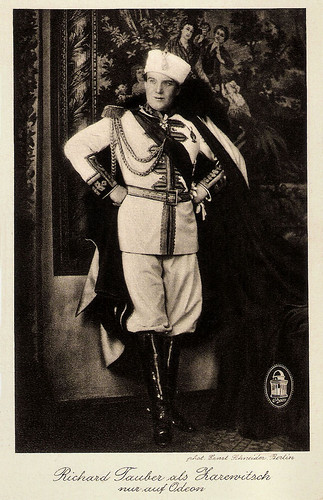
German postcard by Odeon. Photo: Ernst Schneider, Berlin. Caption: Richard Tauber as Zarewitsch (Tsarevich) only on Odeon.
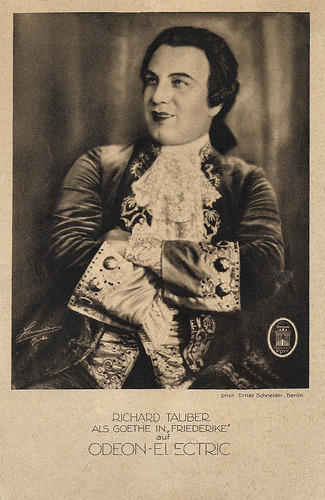
German postcard by Odeon-Electric. Photo: Ernst Schneider, Berlin. Richard Tauber as Goethe in the operetta Friederike in 1928.
In 1933, Richard Tauber was assaulted by a group of Nazi Brownshirts because he was part Jewish on his father's side. Despite his fame and popularity, he decided to leave Hitler's Germany for his native Austria.
He often worked in London where he appeared in some musical films. He earned fine notices for his portrayal of composer Franz Schubert in Blossom Time (Paul L. Stein, 1934), as well as for his work in Heart's Desire (Paul L. Stein, 1935), and Land Without Music (Walter Forde, 1936).
He married his British co-star Diana Napier. They appeared together again in the Leoncavallo tragedy Pagliacci (Karl Grune, 1936). In 1938, he made his London operatic debut in Die Zauberflöte under Sir Thomas Beecham.
Earlier that year, Nazi Germany annexed Austria and Tauber left Austria for good. Despite receiving lucrative offers from the USA, he remained in the UK for the entire war.
In 1947, Tauber sought help for an aggravated cough which was subsequently diagnosed as lung cancer. The Vienna State Opera was in London for a short season at the Royal Opera House at Covent Garden and they invited Tauber to sing one performance with his old company. He gave a bravura performance as Don Ottavio in 'Don Giovanni' and fulfilled this engagement the following day at the Camden Theatre, having begun and ended his formidable career performing Mozart.
Three days later, he entered a London hospital to have his left lung removed, but it was too late. Richard Tauber died of complications in January 1948. He was 56. In the musical bio Du bist die Welt für mich/You Are the World for Me (Ernst Marischka, 1953) Rudolf Schock acted and sang the role of Tauber.
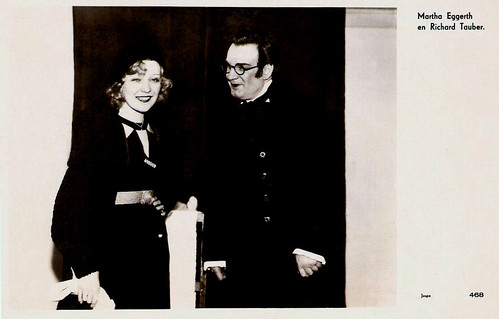
Dutch postcard by JosPe, no. 468. With Marta Eggerth.

German collectors card in the series 'Vom Werden deutscher Filmkunst - Der Tonfilm', album no. 11, picture no. 25. Photo: Bayerische Filmges. / Ross Verlag. Richard Tauber in Das Land des Lächelns/The Land of Smiles (Max Reichmann, 1930).

German postcard by Ross Verlag, no. 5880/1, 1930-1931. Photo: Walther Jaeger, Berlin.

German postcard. Richard Tauber and Petra Unkel in Melodie der Liebe (Georg Jacoby, 1932). Caption: We will soon bring the artistic film event of 1932. Chamber singer Richard Tauber with his daughter in the film "Melody of Love". Don't miss out on this real film wonder.

French postcard in the Europe series, no. 997, ca. 1932. Photo: Emelka Konzern.

German postcard by Ross Verlag, no. 5251/1, 1930-1931. Photo: Atelier Ernst Schneider, Berlin.

German postcard by Ross Verlag, no. 6307/1, 1931-1932. Photo: Atelier Jacobi, Berlin.

German postcard by Ross Verlag, no. 8540/1, 1933-1934. Photo: Dietrich, Wien.
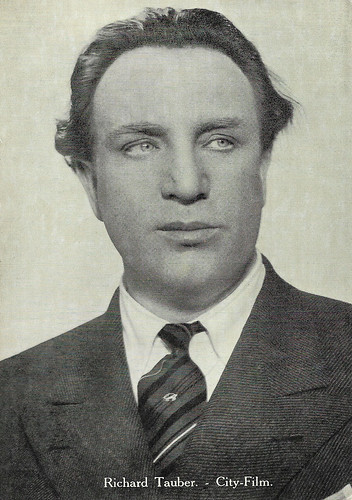
Dutch postcard by Smeets & Schippers, Amsterdam. Photo: City-Film.
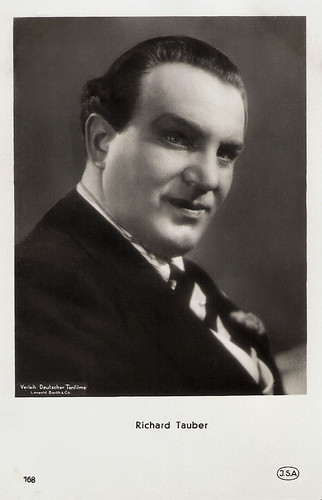
Dutch postcard by J.S.A., no. 168. Photo: Verleih Deutscher Ton-Filme / Leopold Barth & Co.
Sources: Gary Brumburgh (IMDb), Trevor Peak (Find A Grave), Wikipedia and IMDb.

German postcard in the Ross Luxusklasse series by Ross Verlag, no. 548, 1919-1924. Photo: Atelier Schneider, Berlin.

German postcard by Ross Verlag, no. 4877/1, 1929-1930. Photo: Atelier Ernst Schneider, Berlin / Tauber Tonfilm G.m.b.H.

Dutch postcard. Photo: Filma Film. Publicity still for Ich glaub nie mehr an eine Frau/Never Trust a Woman (Max Reichmann, 1930).

German postcard by Ross Verlag, no. 7564/1, 1932-1933. Photo: H. Jeidels, Berlin. Richard Tauber as Ito in tha stage operetta 'Frühlingsstürme' (1933, Spring Storms). Jaromir Weinberger’s operetta 'Frühlingsstürme' was "the last Weimar Republic operetta”. It was written for Richard Tauber and premiered at the end of January 1933. After only 20 performances – disturbed by rioting Nazi troups – the show was gone, and forgotten, except for a few obligatory Tauber recordings and this postcard. In 2019, 'Frühlingsstürme' was finally restaged at the Komische Oper in Berlin.

German postcard by Ross Verlag, no. 7048/1, 1932-1933. Photo: Atelier Schneider, Berlin. Richard Tauber as composer Franz Schubert in Blossom Time (Paul Stein, 1934), in Germany known as 'Das Driemäderlhaus' (House of the Three Girls). Tauber played Schubert in several productions and tours of 'Das Dreimäderlhaus' in Europe, first at Plauen, Germany, on 24 January 1920, and then in five performances of the original version at the Theatre an der Wien in October 1921. He presented a new version of it in German in 1933 at the Aldwych Theatre under the title 'Lilac Time', adapted by himself and Sylvio Mossée. Tauber then made the 1934 film version.
Illegitimate Son
Richard Tauber was born in Linz, Austria in 1891. He was the illegitimate son of soubrette Elisabeth Seiffert and actor and theatre director Richard Anton Tauber. He was given the name Richard Denemy (Denemy being his mother's maiden name).
The boy was raised by his mother until he was seven and later by his father, who officially gave Richard his name. At the Hoch Conservatory in Frankfurt, he studied piano, composition and conducting, subjects which stood Tauber in good stead in later years. He was heard singing by the well-known voice teacher Professor Carl Beines, who encouraged him to sing more quietly and to interprete the works of Wolfgang Amadeus Mozart.
In 1913 he made his stage debut as Tamino in Mozart's 'Die Zauberflöte' (The Magic Flute) with the help of his father, who had become the Intendant of both the Stadt-Theater in Chemnitz. He was quickly engaged for major roles at the Dresden Opera, where he stayed until 1926. Then he joined the Vienna Staatsoper.
In these years, he worked up a rich repertoire of roles in such operas as 'Don Giovanni', 'Tosca', and 'Carmen'. Franz Lehár composed several operettas specifically designed for Tauber's voice, including 'Der Zarewitsch' (1926), 'Friederike' (1928), and 'Das Land des Lächelns/The Land of Smiles' (1929). Tauber made over seven hundred gramophone records, mainly for the Odeon Records label. His recordings include opera, operetta, art song, popular tunes and novelties.
He also tested the then new talking pictures in such popular musical films as Ich küsse Ihre Hand, Madame/I Kiss Your Hand Madame (Robert Land, 1929) with Marlene Dietrich, Das Land des Lächelns/The Land of Smiles (Max Reichmann, 1930), and Melodie der Liebe/Right to Happiness (Georg Jacoby, 1932).
Richard Tauber was elegant in appearance. He had a slight squint in his right eye and disguised it by wearing a monocle which, when accompanied by a top hat, added to the elegant effect. For many people he became the epitome of Viennese charm.

German postcard by Ross Verlag, no. 124/1. Photo: Emelka / Tauber. Richard Tauber in Das Land des Lächelns/Land of Smiles (Max Reichmann, 1930).

German postcard by Ross Verlag, no. 124/2. Photo: Emelka / Tauber. Richard Tauber and Hella Kürty in Das Land des Lächelns/Land of Smiles (Max Reichmann, 1930).

German postcard by Odeon. Photo: Ernst Schneider, Berlin.

German postcard by Odeon. Photo: Ernst Schneider, Berlin. Caption: Richard Tauber as Zarewitsch (Tsarevich) only on Odeon.

German postcard by Odeon-Electric. Photo: Ernst Schneider, Berlin. Richard Tauber as Goethe in the operetta Friederike in 1928.
Land Without Music
In 1933, Richard Tauber was assaulted by a group of Nazi Brownshirts because he was part Jewish on his father's side. Despite his fame and popularity, he decided to leave Hitler's Germany for his native Austria.
He often worked in London where he appeared in some musical films. He earned fine notices for his portrayal of composer Franz Schubert in Blossom Time (Paul L. Stein, 1934), as well as for his work in Heart's Desire (Paul L. Stein, 1935), and Land Without Music (Walter Forde, 1936).
He married his British co-star Diana Napier. They appeared together again in the Leoncavallo tragedy Pagliacci (Karl Grune, 1936). In 1938, he made his London operatic debut in Die Zauberflöte under Sir Thomas Beecham.
Earlier that year, Nazi Germany annexed Austria and Tauber left Austria for good. Despite receiving lucrative offers from the USA, he remained in the UK for the entire war.
In 1947, Tauber sought help for an aggravated cough which was subsequently diagnosed as lung cancer. The Vienna State Opera was in London for a short season at the Royal Opera House at Covent Garden and they invited Tauber to sing one performance with his old company. He gave a bravura performance as Don Ottavio in 'Don Giovanni' and fulfilled this engagement the following day at the Camden Theatre, having begun and ended his formidable career performing Mozart.
Three days later, he entered a London hospital to have his left lung removed, but it was too late. Richard Tauber died of complications in January 1948. He was 56. In the musical bio Du bist die Welt für mich/You Are the World for Me (Ernst Marischka, 1953) Rudolf Schock acted and sang the role of Tauber.

Dutch postcard by JosPe, no. 468. With Marta Eggerth.

German collectors card in the series 'Vom Werden deutscher Filmkunst - Der Tonfilm', album no. 11, picture no. 25. Photo: Bayerische Filmges. / Ross Verlag. Richard Tauber in Das Land des Lächelns/The Land of Smiles (Max Reichmann, 1930).

German postcard by Ross Verlag, no. 5880/1, 1930-1931. Photo: Walther Jaeger, Berlin.

German postcard. Richard Tauber and Petra Unkel in Melodie der Liebe (Georg Jacoby, 1932). Caption: We will soon bring the artistic film event of 1932. Chamber singer Richard Tauber with his daughter in the film "Melody of Love". Don't miss out on this real film wonder.

French postcard in the Europe series, no. 997, ca. 1932. Photo: Emelka Konzern.

German postcard by Ross Verlag, no. 5251/1, 1930-1931. Photo: Atelier Ernst Schneider, Berlin.

German postcard by Ross Verlag, no. 6307/1, 1931-1932. Photo: Atelier Jacobi, Berlin.

German postcard by Ross Verlag, no. 8540/1, 1933-1934. Photo: Dietrich, Wien.

Dutch postcard by Smeets & Schippers, Amsterdam. Photo: City-Film.

Dutch postcard by J.S.A., no. 168. Photo: Verleih Deutscher Ton-Filme / Leopold Barth & Co.
Sources: Gary Brumburgh (IMDb), Trevor Peak (Find A Grave), Wikipedia and IMDb.
No comments:
Post a Comment